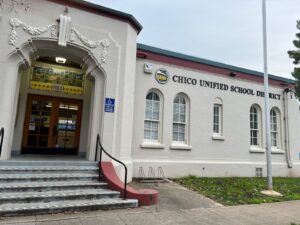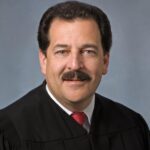by Natalie Hanson
posted Jan. 24
Educators and experts have joined California’s leaders in urging an appeals court to uphold a ruling that supports Chico Unified School District’s (CUSD’s) anti-discrimination policy.

California’s Attorney General Rob Bonta filed Jan. 9 in support of the district, along with representatives of 15 other states, arguing that the policy is designed to be flexible on a case-by-case basis to support transgender and gender-nonconforming students, and to withhold parental notice when a student does not consent. The only exception for parental notification, against a student’s wishes, is if the student’s well-being is at risk.
The statements of support came in response to an appeal filed by Chico parent Aurora Regino, who wants to overturn a federal judge’s decision last year rejecting her opposition to nondisclosure that is a product of the district’s broader anti-discrimination policy.

Regino says in her appeal, filed in October, that the federal judge denied her right as a parent to control the upbringing of her child, and to contest what she says was a school district that was able “to perform psychological treatment on her children behind her back.”
The Ninth Circuit Court of Appeals is considering hearing arguments in Regino’s case in Pasadena. During the second week of January, state organizations and experts filed many amicus briefs to join in support of CUSD’s policy that protects student privacy. That policy recommends that school officials follow student wishes to disclose or not disclose sensitive conversations to parents, including about possible pronoun changes.
Regino’s case, if successful, would out students
Her lawsuit, filed in federal court in the Eastern District of California, said her child told a school counselor they wanted to use new pronouns at school, and decided with the counselor’s guidance not to tell their mother right away. Regino claims it is her right as a parent to know why her child sought counseling.
The lawsuit was the third in California over gender identity filed by the right-wing Center for American Liberty, headed by Harmeet Dhillon, formerly an adviser to President Donald Trump. It came at a volatile moment nationally as conservatives fired up their base with attacks on transgender rights.
Last summer, Senior U.S. District Judge John Mendez -– who was appointed to the bench by former President George Bush — ruled that Chico Unified successfully identified legitimate government purposes for its nondisclosure policy and for protecting the rights of LGBTQ students to privacy, freedom from discrimination, and health and safety as guaranteed by federal and state statutes and constitutional provisions.

Students have a legally-protected privacy interest under the California Constitution with respect to information about their gender identity, the judge said. He added that Chico Unified’s policy is “not proactive, but reactive; district staff are not directed to force students to adopt transgender identities or keep their identities secret from their parents.”
The brief filed by the attorneys’ general offices, which included the states of Colorado, Maine, Maryland, Oregon, Washington and New York, said CUSD’s policy is consistent with the state’s policy. That policy supports and protects transgender and gender nonconforming students, who are particularly “vulnerable to abuse, suicide and other concrete harms caused by familial rejection and environments hostile to their gender identity.”
The attorneys general said that states like California have a compelling interest in protecting students and ensuring a safe and supportive school environment, as 1 in 10 transgender individuals experience overt violence from a household member, and 15% are forced to leave their home because of their identity.

“Appellant’s interpretation of the First and Fourteenth Amendments, which would require schools to ‘out’ students to their parents against the students’ wishes, could compromise students’ safety by increasing students’ vulnerability to harassment, violence, or other forms of abuse at school or at home,” the officials said.
California’s Department of Education (CDE) also said in a January filing that state law emphasizes the rights of LGBTQ students and requires the department and the State Superintendent of Public Instruction to take action in supporting them. It said Regino’s request would require the court to establish a new fundamental constitutional right for a parent to be automatically informed of a student’s change in gender identity at school.
“However, courts must proceed with utmost care when considering establishing new substantive due process rights,” CDE said. “Parental rights are not absolute or unlimited. In summary, this case bears a much closer resemblance to cases involving parent challenges to curriculum and other public school policy decisions than to cases involving “care, custody or control” generally, or medical care specifically.”
The California Teachers Association as well as associations of school psychologists, nurses and counselors all filed in support as well. The organizations said Regino’s demands for an expanded due process right – to force disclosures to parents – would harm the trusting relationships that school staff have with students. They said educational professionals allow students to lead, and encourage them to engage their parents or guardians and share information with them about their gender identity “when it is psychologically and physically safe for students.”
“The Chico Unified School District policy in question appropriately supports a safe and inclusive learning environment, and plaintiff’s constitutional challenge to that policy fails,” the organizations said in their combined amicus brief. “Rather than intruding into a parent’s personal liberties, the district’s policy – which fully conforms with longstanding legal guidance from the California Department of Education – prevents the government from inserting itself into personal family matters. The policy respects student privacy rights under the California Constitution, and it allows family members to discuss gender identity on their own terms when they choose to do so.”
The organizations said they opposed Regino’s claims that social transitioning is a medical or psychological treatment, noting that students asking an adult to address them with a different name and pronoun is often an early step in exploring gender identity.
“Contrary to appellant’s gross mischaracterization of the district policy, educational professionals do not encourage or maintain ‘parental secrecy’ policies,’” they said. “Educational professionals recommend that as part of a process of supporting a student who ‘comes out’ to an educational professional or who seeks support in their gender identity, educational professionals should discuss with the student how and when they can safely come out to their parent or guardian.”
A number of psychologists and human development experts, such as the California Association of School Psychologists and the California Association of School Counselors, also filed. They assert the stance that requiring school personnel to tell parents about a student’s sexual orientation or gender identity without the student’s consent undermines their role as school professionals.
“School personnel are entrusted to rely on their expertise and professional judgment to provide that guidance; in fact, numerous states protect those conversations from disclosure to encourage students to seek the confidences of school personnel,” the psychologists said in their brief.
Regino says in her appeal: “Not only did the district court apply the wrong legal standard two times over, but it also ignored the complaint’s detailed factual allegations, the weight of case law — including case law from this court — and expert opinion reflecting the widely accepted consensus that social transitioning constitutes psychological treatment.”
Regino also filed a brief Jan. 9 responding to the district, arguing that she is entitled to the right to consent before the district “socially transitions” her children at their school.
“Ms. Regino does not seek to prove that social transitioning constitutes psychological treatment,” said Regino’s legal counsel, Dhillon. “Instead, she seeks only to support the conclusion that her allegation that social transitioning constitutes psychological treatment is plausible.”
Natalie Hanson is a contributing editor to ChicoSol.
